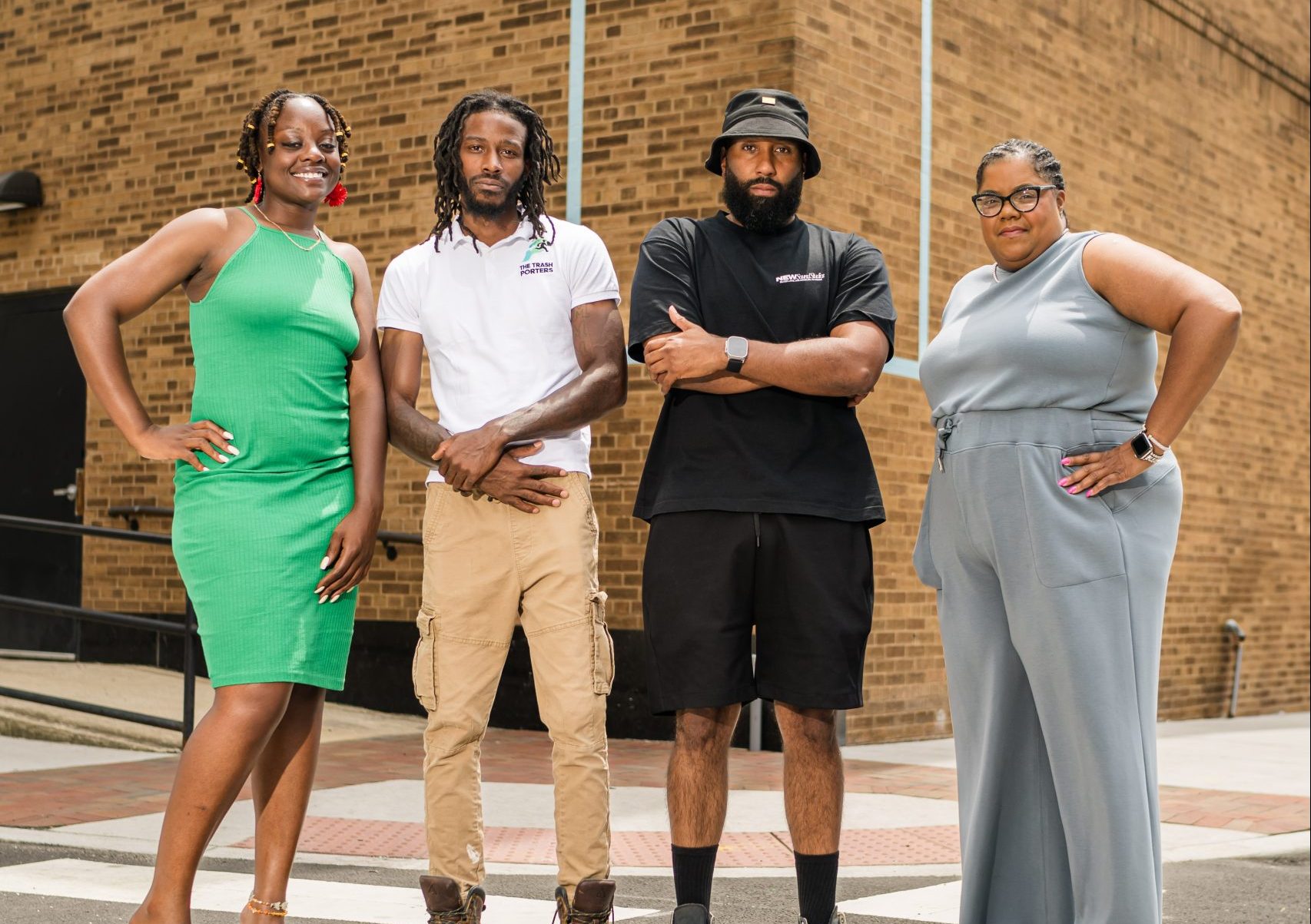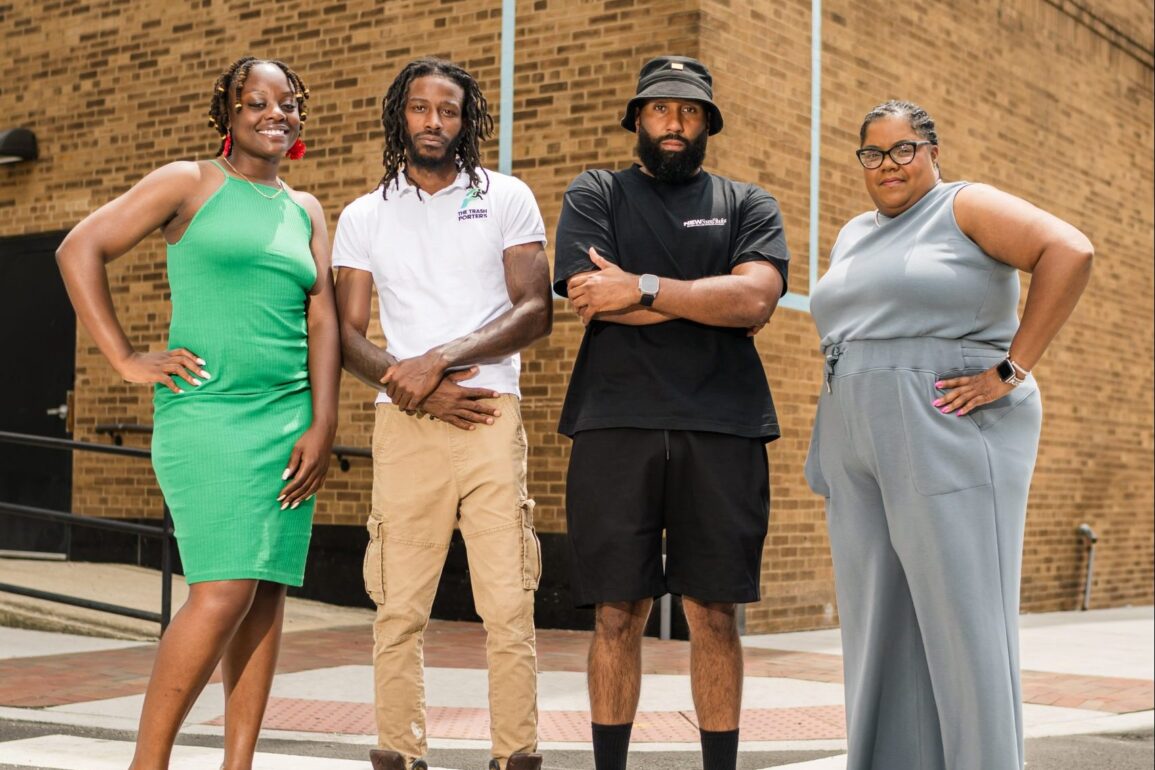
The Stand DE owner Antinette Watson, Trash Porters founder Chris Boozer, Green Box Kitchen owner Jason Aviles and Wilmington Alliance Small Business Program Manage Tish Bracy talk about small business success in Wilmington. | DBT PHOTOS BY JUSTIN HEYES/MOONLOOP PHOTOGRAPHY
WILMINGTON — Chris Boozer has two choices – either breaking his back for overtime at a warehouse or take a risk and that risk meant striking out and starting his own business.
At age 36, he’s already been on a long road. After serving time in prison, Boozer struggled to find his way with work. Jobs at car dealerships fell through once the background checks came back. Working at a cement factory ended when a coworker referred to him with an offensive racist epithet. Selling old cars on a lot independently in West Philadelphia was not as stable.
“I just kept looking for anything, any problem to solve,” Boozer said. “That’s when I noticed the huge inconvenience in taking out the trash while on the third floor of my apartment. People were driving their cars up to dumpsters and taking it out of the trunk. It was craziness. That’s when I realized I could handle this.”
That’s where his idea for trash valet service, Trash Porters, was born, and it started with a single pick up truck.
Last year, Boozer won the New Castle County Chamber of Commerce Emerging Enterprise Center’s Swim with the Sharks Program, landing $10,000 for the new venture. He officially launched his company and bought a new dump truck and hired two employees.
But it was an uphill battle for him to get there. Between the idea and the pitch competition win, he became homeless, he did research on every certification and sanitation requirement needed. Boozer started networking at all the local chamber of commerce, he got involved with the Wilmington Alliance, the Pete du Pont Freedom Foundation and others to help build his business plan. Stacking all those opportunities, he said, helped him chart his course and make connections.
Trash Porters landed a contract with the county to collect the trash for Reggae in the Park in Glasgow which drew 22,000 people. He also found contracts with the CSC Station, as well as some homes and property management companies in the state and also now collects recycling from big companies on Fridays.
While there’s been wins, Boozer is still scrapping to get his business out of start-up mode. The Trash Porters recently added two dump trailers for junk removal and brought on two additional contractors to assist with the workload.
“I tell people, if there’s no trash, there’s no food. If I want to pay my bills, I have to get out there and promote,” Boozer said. “The beautiful thing about Delaware is that no one knew me and people were so open to talking if you just went to networking groups and got in programs. I had to break out of the Philly mentality where it’s stern faces when you walk on the street.”
Wilmington’s business
Boozer and his company are just one of hundreds of small Black businesses in Wilmington and thousands more in Delaware. The U.S. Census Bureau found that Black-owned businesses increased by 14% since 2020. The Delaware Black Chamber of Commerce reports it has 148 members in the city.
Between 2017 and 2021, there were 161,031 U.S. firms with majority Black ownerships and the revenue soared by 43% in the same timeframe. That said, about 3% of all U.S. businesses were owned by Black business owners that year. They also tend to be smaller businesses; the report found that two-thirds had fewer than 10 employees.
For decades, Wilmington has been growing more diverse, although more than half of its residents are Black or African American. The city’s population is close to 71,000, and about 56% are Black, according to the U.S. Census in 2020. In comparison, the white population is 28%, and the Hispanic population is 13%
Against the backdrop of DuPont’s influence in shaping the city over the years and banking giants like MBNA, JPMorgan Chase & Co. and Bank of America that drew hundreds of business professionals to the city, there were also convenience stores, tailors and restaurants to cater to workers at those institutions during lunch hours.
It also led to businesses like the one started by Antinette Watson’s family on 27th and Market Street. She lived in the Riverside projects for a long time and said her mom and Pop-Pop’s water ice stand became a staple of her community.
“One of the common misconceptions I’ve heard is that we don’t support each other. I’ve seen so much love from the community, especially from the low-income, high-crime communities when someone’s trying to do something positive,” Watson said.
She’s seen it first hand when she launched The Stand DE in 2018, a hotdog stand that first began as a nonprofit aimed to give workforce skills to teenagers from her own community. The hot dog cart was bought with her tax return money for $7,000. Two months later, she made $10,000.
“I thought I hit the lottery,” she said with a laugh. “We just try to stay in our lane. If you want a really good hot dog, you come to The Stand. And there’s people who want that.”
Enrolling in the Equitable Entrepreneurial Ecosystem (E3) program, first started by the Pete du Pont Freedom Foundation and now run by the Wilmington Alliance, changed everything. Watson, who holds a master’s degree in administration of human services, realized she didn’t have a nonprofit; she had a business.
That realization sparked Watson’s need for more business education. From there, she became one of the first members of the Kitchen Collective which gives food entrepreneurs low-cost kitchen space to grow the business. Then she joined the West End Neighborhood House Launcher program and Enrich Delaware which is run by the Delaware Black Chamber of Commerce.
“I tried to take advantage of them all because education is important. These programs also came with coaches that held my hand through the process while I’m learning,” she said.
Today, the Stand DE has grown to two hot dog carts and a trailer that can hook up to her car. Watson has a business partner and now her mom has joined in. Watson’s new goal is to get a brick-and-mortar location and eventually start franchising.
“My passion is people. I like to develop people and it’s just that hot dogs are helping me do that,” she said.
Resources
Small business resources and Wilmington’s tight-knit community does help spread the good word about businesses in need of contracts. It’s how The Stand heard about corporate company picnics. But for those entrepreneurs who are just starting out, finding a foot in the door can be a struggle in itself, said Latisha Bracy, the Wilmington Alliance Entrepreneurship & Small Business Program Manager.
“Wilmington is rich with resources, but it’s about finding them and where you can go,” Bracy said. “It’s so small that once you can connect with one and ask around, you can hear about things like the Pete du Pont Freedom Foundation or True Access Capital. But it can be a little siloed.”
The COVID-19 pandemic highlighted the significant gaps between what small businesses need and the resources available to them. The Wilmington Alliance opened the Wilmington Strong fund that offered micro grants to small businesses to cover rent, mortgage payments, utility and supplier bills.
“We had about $300,000 in grants awarded. Some of the programs at the time [like the Paycheck Protection Program and the Emergency Economic Injury Disaster Loan] weren’t attainable because some of the businesses weren’t set up with Quickbooks to get the paperwork needed,” she said.
Since it was established in 2019 through the merger of two organizations, Wilmington Alliance has focused on connecting with other organizations to build a network of support programs to bring an entrepreneur’s dreams to reality. That network has helped entrepreneurs like Boozer quickly tap into other organizations to help and learn about what certifications he needed.
“I gave myself no other options because not pursuing it would have been more terrifying. I would have been stuck as a warehouse worker because that was all the jobs people ever saw for me,” Boozer said. “I had to build my own option. There is no other way back.”

Entrepreneurs Chris Boozer, Jason Aviles and Antinette Watson talk about starting their own business in Wilmington. | DBT PHOTOS BY JUSTIN HEYES/MOONLOOP PHOTOGRAPHY
The foot traffic question
On the corner of East Fourth and North Market Street, Jason Aviles sits in front of his restaurant and looks up at a towering construction site. The Buccini/Pollin Group is developing a dormant corner into a 61-unit complex called Humble Park.
“It’s happening,” Aviles said.
The constant development in Wilmington both excites him and raises some questions. He grew up in the Bronx, spent years in education and later studied meditation and more at the Maharishi University of Management in Iowa. He then came back to Wilmington in 2014 as a new vegan with no options.
So, Aviles made one in the Green Box Kitchen. It was years of build up with marketing cold-press juices in the city, heading to Lombard Street and working their way to the West Side and trying to teach customers the health benefits of spending $5 on a watermelon juice in a mason jar.
When his efforts paid off, it paved the way for his vegan venue. Before the pandemic, smoothies and acai bowls didn’t exist downtown — and that drew in a 70% customer return rate and curious moms who were willing to give it a try. COVID-19 actually raised the demand for the Green Box Kitchen.
But it was the years afterwards, as hybrid work grew more common, that have had more of a lasting impact. A couple weeks ago, Chase Bank employees walked a block to Aviles’s restaurant and told him they never knew the restaurant was there.
“I think being in a city that’s constantly changing requires you to constantly have your finger on the pulse. If you look at the foot traffic, it’s not what it is in Newark or Glen Mills, Pa.,” he said. “COVID really taught us that we couldn’t afford to do things that no longer worked. You have to know your customers and the shelf life and costs of your products.”
Unfortunately for small business owners, the other reality is that they simply can’t compete with the resources of national change. A Tropical Smoothie is opening just blocks away from Green Box Kitchen in a more traveled part of Market Street. Rent in some of the major business districts can range between $6,000 and $7,000 per month, making it unattainable for some of the members of the Delaware Black Chamber of Commerce, CEO Ayanna Khan said.
“It’s unaffordable for most of them and certainly as a small nonprofit, we see it ourselves,” she said. “You see Wednesday can be busting, but other days have been quiet. So, there’s no guarantee of foot traffic to support the business and, with the lack of parking, it becomes even greater.”
Wilmington is on the rise with many apartment complexes in development, looking to draw in young professionals interested in the lower cost of living here compared to bigger cities like where Aviles was years ago. But as the times change, he sees a need for greater investment to make sure the small, local stores make it through the storm.
“To really make Wilmington a thriving place for small Black businesses, you have to get the right people to cosign. We’re a tight-knit community and it’s a great thing to have when your brand starts to transcend who you are. But I feel like you have to invest in it. Otherwise, you’ll miss out on a lot of diversity in your businesses that can be a heart of the community,” he said.
“There’s places in cities where there’s all kinds of small businesses and you can feel the pulse of it,” Aviles added. “I hope that’s what we move toward. No matter who you are, there’s a place for you. If we don’t, it’ll just be a couple places that are sprinkled in because we got in early.”
But others like Watson took a more optimistic look at Wilmington, particularly around the Black community. The Stand DE was at the Clifford Brown Jazz Festival In Wilmington Delaware, and did very well, even for a scorching weekend.
“I was born here, and I do see a change in the city, and there’s a diverse vibe around the Black businesses in Delaware. A big misconception is that there’s nothing to do, but in summertime, the city is popping. I love it,” she said.



